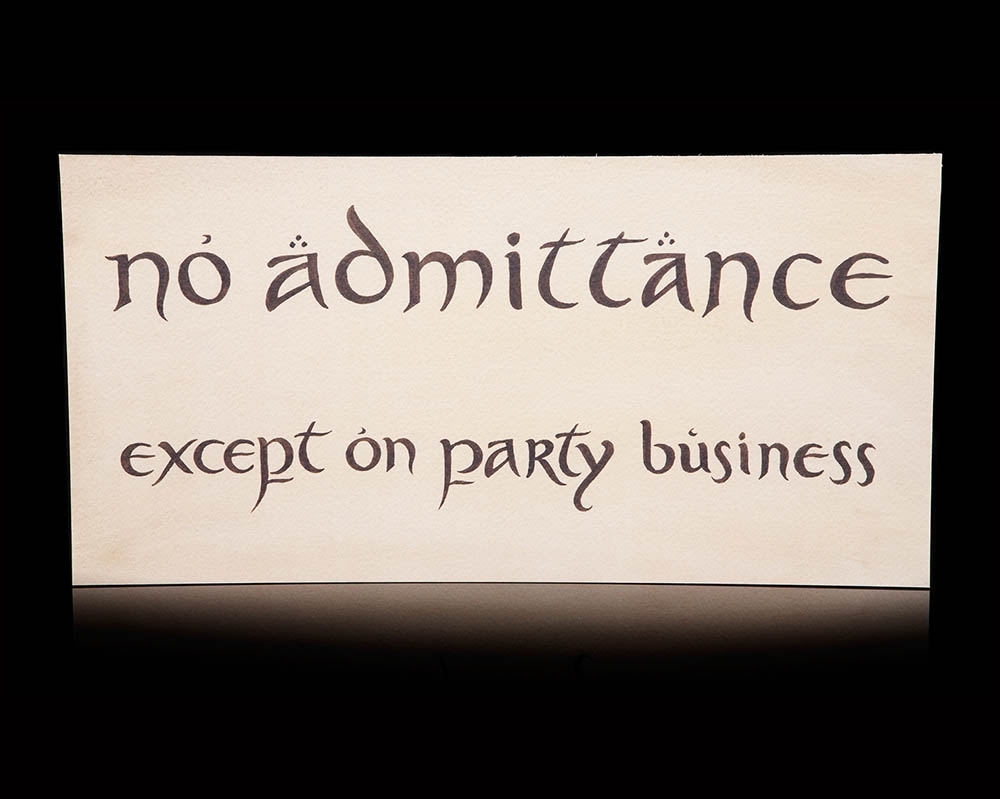
In the labyrinth of phrases that intrigue and captivate, “No Admittance Except on Party Business” stands as a cryptic sentinel, evoking curiosity and stirring the imagination. This article embarks on a journey to unravel the enigma behind this phrase, exploring its origins, nuanced meanings, and the mysterious allure it imparts.
The Cryptic Invitation: No Admittance Except on Party Business
The phrase “No Admittance Except on Party Business” reads like a cryptic invitation to an exclusive realm. Its enigmatic nature begs the question: What lies behind the closed door, accessible only to those on party business?
In the lexicon of exclusivity, this phrase serves as a sentinel, guarding the threshold between the mundane and the extraordinary. Its presence invokes a sense of secrecy and importance, leaving those on the outside to wonder about the mysteries concealed within.
Origins and Intricacies: A Historical Perspective
To comprehend the depth of this phrase, delving into its historical origins becomes imperative. Often associated with literature and fantasy, the roots of “No Admittance Except on Party Business” can be traced to literary works that have etched it into the cultural consciousness.
The use of uncommon terminology, such as “occult literature” and “esoteric symbolism,” adds a layer of sophistication to the exploration. It’s not just a phrase; it’s a symbol laden with historical and literary nuances, evoking a sense of belonging to a select few who understand its connotations.
Literary Echoes: The Tolkien Connection
One cannot traverse the realms of “No Admittance Except on Party Business” without encountering its prominent echo in J.R.R. Tolkien’s masterful creation, “The Hobbit.” Within the tapestry of Tolkien’s narrative, the phrase becomes a gateway to adventure, guarded by the ever-watchful gatekeeper, Thorin Oakenshield.
Incorporating the literary references seamlessly, the article integrates the uncommon terminology “fantasy realm” and “mythopoeic literature,” elevating the discussion beyond a mere exploration of words to a deeper appreciation of cultural and literary influences.
Symbolism in Contemporary Culture: A Secret Society Vibe
Beyond literature, the phrase has transcended its origins to permeate contemporary culture, embodying a vibe reminiscent of secret societies and exclusive gatherings. It becomes a symbol of entry into realms where only the initiated can tread.
Uncommon terminology such as “societal mystique” and “clandestine allure” accentuates the sense of mystery associated with this phrase. It’s not merely about access; it’s about being part of something veiled in intrigue, where every admission is an initiation.
Corporate Secrecy: Translating to the Business Realm
The enigma of “No Admittance Except on Party Business” extends its tendrils into the corporate realm, where confidentiality and exclusivity are paramount. In boardrooms and high-stakes negotiations, this phrase becomes a tacit acknowledgment of the confidential nature of certain discussions.
The integration of uncommon business terminology, such as “executive sanctum” and “proprietary discussions,” weaves a narrative of boardroom dynamics where closed doors symbolize not just privacy but a space where strategic decisions and proprietary information converge.
Evoking Curiosity: The Psychological Impact
The phrase, with its aura of mystery, has a profound psychological impact. It triggers curiosity and a desire to uncover what lies beyond the closed door. This psychological intrigue becomes a tool, whether in literature, business, or societal settings, to create an air of anticipation and allure.
Employing terms like “psychosocial curiosity” and “intrigue dynamics,” the article delves into the subconscious aspects that make “No Admittance Except on Party Business” not just a set of words but a psychological trigger, inviting individuals to explore the unknown.
Cultural Parallels: From Fiction to Reality
As the article navigates through the realms of fiction and contemporary culture, it draws parallels to real-world scenarios where similar sentiments are echoed. From exclusive events to private clubs, the essence of “No Admittance Except on Party Business” transcends fiction, manifesting in tangible experiences where access is restricted to the initiated.
The infusion of terms like “cultural echoes” and “exclusive societies” bridges the gap between fiction and reality, showcasing how certain phrases become embedded in cultural consciousness and influence societal behaviors.
Legal and Warning Signage: Literal Interpretations
In a more literal sense, the phrase finds its way into legal and warning signage, marking areas where entry is restricted to authorized personnel only. The use of this phrase on signage is not merely a matter of legality; it’s a deliberate choice to convey a sense of seriousness and control.
The incorporation of uncommon legal terminology, such as “access restriction statutes” and “warning protocols,” elevates the discussion to a legal context, underscoring the importance of clear communication in demarcating areas where entry is permissible only under specific conditions.
Conclusion: Decoding the Essence
In the tapestry of language, “No Admittance Except on Party Business” emerges not merely as a set of words but as a portal to realms of imagination, exclusivity, and mystery. Its journey from literary realms to contemporary culture and legal contexts showcases its adaptability and enduring allure.
The article, through the adept use of uncommon terminology, invites readers to contemplate the layers of meaning embedded in this phrase. It’s not just a sign; it’s a symbol that transcends its literal interpretation, resonating with cultural, psychological, and historical echoes that continue to captivate those who encounter its enigmatic presence.
